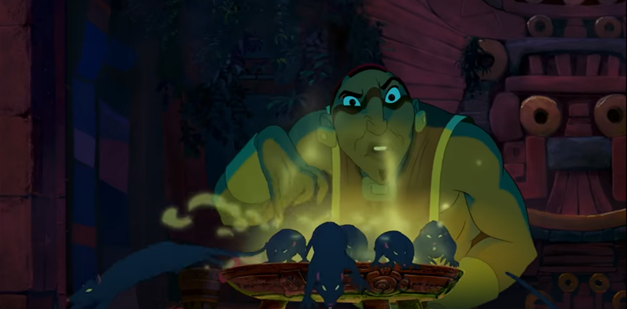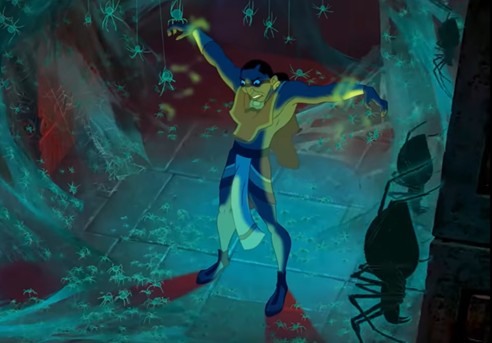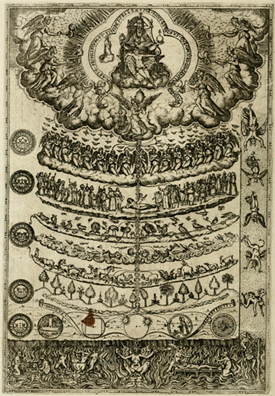The Road to El Dorado subverts humanity’s usual place at the apex of creation. In this scene the High Priest, Tzekel-Kan, explains to Tulio (whom he believes to be a God) the importance of human sacrifice in gaining the fear and worship of the people, thus placing humanity somewhere near the bottom of a divine hierarchy. He conjures snakes, rats, and spiders, comparing each to a negative human attribute, effectively personifying sins in animal form – snakes are “spineless and slippery”, rats “cheat[] without remorse”, and spiders spin “webs of lies”.


Each conjured animal is demonised in western culture, with many people expressing disgust and fear regarding rats, spiders and snakes. In this scene they are given glowing green eyes and are entirely uniform in appearance. Paired with the diegetic sounds of scurrying and hissing, the conjured animals appear as nightmarish versions of their real-life equivalents, evoking an uncomfortable atmosphere which helps to present Tzekel-Kan’s low regard of humanity in his comparison with these animals.

Valades, Rhetorica Christiana 1579
The hierarchy established in this scene, namely the huge disparity of worth between God’s and humanity, bares a strong resemblance to The Great Chain of Being – an aspect of Medieval Christianity that placed all life into a hierarchical structure. According to this belief, each tier of life “is perfect because it seeks for nothing, and possesses nothing, and has need of nothing; and being perfect, it overflows, and thus its superabundance produces an Other.” [1] Tzekel-Kan’s manifestation of sin in animal form suggests a religious belief very much like this one, where the imperfection and evil of the human race created beings like snakes and spiders, and so sin should be personified by the animals that humanity’s sin brought forth.
Following this, he asks how the Gods would like to consume their sacrifices, “bound to an altar, or…free range”. This is an interesting way of wording things, as such language originates from descriptions of eggs or meat, meaning that the priest is closely comparing humanity to chickens. Following such logic, it would seem that Tzekel-Kan not only considers humans to be just another species of animal, but as a type of meat, no more unusual than beef or pork. Further displaying his perception of humanity, Tzekel-Kan seems to show not just a low opinion of humanity but an utter disregard of their worth, his language reminiscent of the insignificant worrying humans do concerning meat production. The gallows humour helps to establish him as an anti-hero, as so far, the Priest’s extremely unethical viewpoint regarding humans has been entertaining.
His casual approach to the discussion of human sacrifice paired with his word choice – “devouring”, represents a violent animalistic divinity. Insisting that it is “prophesised” that “the age of the jaguar will be written in…blood”, represents the Gods as extremely aggressive and ruthless, baring a close resemblance to dangerous wild animals. As a result, actions that resemble that of a wild animal are seen to be more divine and perfect, than traditionally accepted norms of human behaviour.
[1] The Editors of Encyclopaedia Britannica, ‘Great Chain of Being’, Encyclopaedia Britannica <https://www.britannica.com/topic/Great-Chain-of-Being> [accessed 25 April 2020]